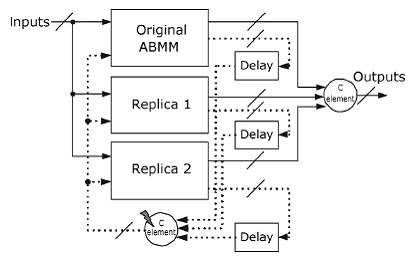





Published on Nov 30, 2023
We discuss the problem of soft errors in asynchronous burst-mode machines (ABMMs), and we propose two solutions. The first solution is an error tolerance approach, which leverages the inherent functionality of Muller C-elements, along with a variant of duplication, to suppress all transient errors.
The proposed method is more robust and less expensive than the typical triple modular redundancy error tolerance method and often even less expensive than previously proposed concurrent error detection methods, which only provide detection but no correction.
The second solution is an error mitigation approach, which leverages a newly devised soft-error susceptibility assessment method for ABMMs, along with partial duplication, to suppress a carefully chosen subset of transient errors.
Three progressively more powerful options for partial duplication select among individual gates, complete state/output logic cones, or partial state/output logic cones and enable efficient exploration of the tradeoff between the achieved soft-error susceptibility reduction and the incurred area overhead.
Furthermore, a gate-decomposition method is developed to leverage the additional soft-error susceptibility reduction opportunities arising during conversion of a two-level ABMM implementation into a multilevel one. Extensive experimental results on benchmark ABMMs assess the effectiveness of the proposed methods in reducing soft-error susceptibility, and their impact on area, performance, and offline testability

1) A duplication-based soft-error-tolerant ABMM design methodology, which leverages the inherent functionality of C-elements to reduce the cost and improve the robustness of the triple modular redundancy (TMR) approach.
2) A soft-error susceptibility assessment methodology for ABMMs, based on an enhanced version of a previously developed asynchronous-circuit fault simulator.
3) A soft-error mitigation solution, based on the newly developed soft-error susceptibility assessment methodology. Three alternative partial duplication options, which select judiciously among individual gates, complete cones of state/output logic, or partial cones of state/output logic, are proposed in order to explore the tradeoff between area overhead and SER reduction in ABMMs
4) A gate-decomposition strategy, which maximizes the ability of the decomposed structure to suppress soft errors when a two-level ABMM is converted into a multilevel equivalent. Formulated as an integer linear program (ILP), the proposed method aims at maximizing logic masking through efficient distribution of the input signals of each decomposed gate to its constituents.
) A halting-based test generation method that retains offline testability for most faults in a soft-error-tolerant ABMM, based on an extension of a previously developed test generation tool
VHDL
Simulation: modelsim5.8c
Synthesis: Xilinx 9.1